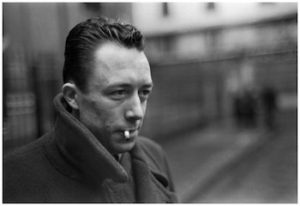
Albert Camus
On this date, in 1913, Albert Camus was born. He was a French North African writer.
Camus (pronounced Kam-oo) was born into a poor working-class family, which only got poorer once his father was killed in WWI. Camus' family was French Algerian (pied-noir) settlers from Mondovi, Algeria. His mother was of Spanish descent. His father, Lucien, died in the Battle of the Marne in 1914 while serving as a member of the Zouave infantry regiment.
Camus spent his childhood in the Belcourt section of Algiers. After his father's death, he moved into a small apartment with other family members while his mother supported them as a charwoman. This early poverty made Camus sympathetic rather than bitter. In school, his teachers recognized his intelligence and helped him win scholarships.
The first signs of tuberculosis, which would plague him his entire life, ended his participation in sports and forced him to move out of the crowded, unhealthy apartment. After briefly living with an uncle, Camus lived independently, studying philosophy at the University of Algiers while working odd jobs. He excelled in his studies, and his thesis on Plotinus and Augustine opened the door for an academic career, which his tuberculosis shut down. After flirting with Communism, Camus became heavily involved in acting, producing, and adapting pieces for the Workers' Theater, a group that brought theater to the working class.
He then began a journalism career as an editor, reporter, and reviewer, which he continued to pursue after moving to Paris in 1925. Camus quickly fell in with Parisian avant-garde leftists like Jean-Paul Sartre, who admired Camus's attempts to ground political action in solid morality. This was a journalistic flair of intersectionality that he embraced. Camus married a morphine addict during this time, and the marriage was short-lived. Camus married again, but this didn't stop his sensuous nature from seeking out other women. He maintained long-standing affairs with several famous French women. Throughout his life, Camus didn't give up his mistresses; he merely added women who were content to share different parts of his life. After WWII, Camus joined the Resistance with his other avant-garde compatriots.
He edited a daily resistance newspaper that became Combat after the war, a daily that espoused leftist politics. In 1942, Camus published "The Stranger," which brought him immediate success and acclaim. However, he quickly became disillusioned with the absolutism of both the right and the left. The right already disapproved of him, and now, with his disillusionment of the left, he was very much alone. Camus wrote a work severely critical of the neo-Marxists that started a feud with Sartre. He continued writing novels and essays and began adapting the works of Dostoevsky and Faulkner for the stage. 1956 he was awarded the Nobel Prize, becoming the second-youngest writer to receive it. In his Nobel acceptance speech, Camus said he would have given the prize to Malraux.
A civil war broke out in Algeria, pitting the native Algerians against the French colonialists. Camus, who had always known where he stood in political matters, was torn between sympathy for the native Algerians and his identity as a Frenchman. Many people faulted Camus for not issuing a definitive statement on the matter. On January 4, 1960, Camus died in an automobile accident with his publisher, Gallimard, at the wheel.